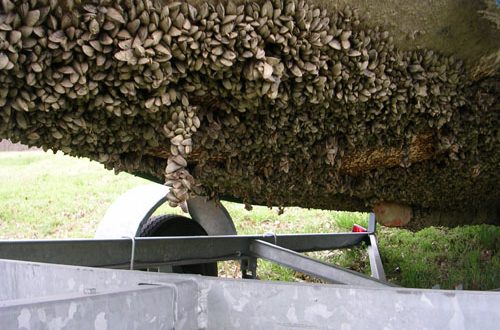Inspections halt boats carrying invasive mussels from entering British Columbia waters.
A team of inspectors has checked 3,200 watercraft and identified six boats confirmed to be carrying invasive mussels.
Conservation Officer Service spokesman Chris Doyle says the inspected vessels arrived in B.C. from 33 different provinces and states across North America.
He says 18 decontamination orders have been issued and 16 boats were quarantined for 30 days to ensure any attached organisms or water in the hulls had completely dried.
Zebra and quagga mussels are fingernail-sized, freshwater mollusks that can easily attach themselves to objects and other organisms.
They can clog pipes of water treatment and power plants, disrupt ecosystems with large monocultures, are difficult to remove and non-native to British Columbia. Zebra and quagga mussels are an ALERT SPECIES—currently they have not become established in Oregon, Idaho, Washington, Montana or British Columba—prevention is key! Zebra mussels grow up to 15 mm in size and have a “D-shaped” shell that can lay flat on surfaces.
Their colour may vary from light to dark brown and the shell has obvious striping. Quagga mussels grow up to 20 mm in size. Its shell is rounder in shape than the zebra mussel and does not sit flat. The color of the quagga shell is pale near its hinge and usually features dark, concentric rings. The best identifying characteristic these two mussels share (which our native mussels do not have) are their tough byssal threads. Byssal threads are strong, sticky fibers that certain mollusks (including some mussels) use to attach themselves to rocks and other surfaces.
Both of these species originate from Europe. They were introduced to Canada (in the Great Lakes region) and the United States in the 1980s, as the result of ballast water being discharged by vessels travelling from Europe. Since then, mussels have been found in the Great Lakes in Ontario and Quebec, and in at least 24 American states as far west as California and Colorado.
Eight inspection stations were added on major B.C. waterways in March to spot boats contaminated with mussels that have already been identified in Ontario, Quebec and at least 24 American states.
Agencies/Canadajournal
 Canada Journal – News of the World Articles and videos to bring you the biggest Canadian news stories from across the country every day
Canada Journal – News of the World Articles and videos to bring you the biggest Canadian news stories from across the country every day



